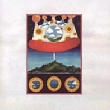|
|

Olivia Tremor Control
Music from the Unrealized Film Script: Dusk at Cubist Castle
Good morning class. As some of you may be aware, there is a special reason for arranging this supplementary lecture to our series on psychedelic pop music. Olivia Tremor Control, who released their two albums through the now defunct Flydaddy label in the '90s, have now reissued those out-of-print works of genius through their own Cloud Recordings label. [Gasps.] You may well gasp class! Those of you struggling in vain to get hold of extortionately priced copies of these albums through eBay can now get them directly through Cloud Recordings for an absurdly reasonable price. So, why is the reissue of these two albums reason enough for me to arrange this lecture and drag you all out of bed? [A smattering of laughter; some groans.] Simple: aside from the new Circulatory System recordings - which, as I'm sure you all know, are some of the finest music put to tape - the two Olivia Tremor Control albums are the apex of experimental pyschedelic pop outside of the 1960s, and offer a wealth of examples that you can all draw on when taking our exams this summer. [Widespread groans.] That is, class, until these records will no doubt besurpassed by the long-awaited sophomore album Blasting Through from Circulatory System, the delays to which have played some part in my pattern baldness. [Some laughter.] OK class: put on your headphones. What you are going to hear is "Jumping Fences" from Dusk at Cubist Castle. [Students listen intently to the track, many tapping their feet, smiling, and humming along.] Now, what you've just heard so perfectly authenticates the beautiful feel of a lot of the best '60s records, that detractors have labelled Olivia Tremor Control mere copyists. What these detractors fail to acknowledge is that the feel-good atmosphere that prompted a lot of you to tap along is incredibly difficult to create. And balanced with the comparatively introspective lyrics, this creates a feeling of understanding and warmth that is at once incredibly familiar yet surreal. This is the gorgeous balance that Olivia Tremor Control manage to maintain throughout the two albums. The first half of Dusk... is nigh-on perfect: song after song of endlessly replayable pop music. You can listen to this in your spare time. However, what we're going to hear now, if you'd all like to replace your headphones, is the "Green Typewriters" suite. [Some students sit listening attentively, others remove the headphones and start talking amongst themselves; some leave the lecture theatre and slam the door after them.] What our friends who didn't manage to sit through that sequence are realising is that experimental psychedelic pop can challenge as well as immediately gratify. By using field recordings and extended periods where no recognisable 'songs' are heard, the band are allowing the listener's attention to shift in focus. Although initially frustrating, the more you listen to the album as whole, the more you'll appreciate the way in which these more 'difficult' parts help to create a balance, as the balance works within individual songs. I saw some of you air guitaring as the "How much longer can I wait?" part kicked off after the abstract passage (track 19). That wouldn't have had nearly so much power in any other context. [Nods and grunts of affirmation from many.] Moving on to Black Foliage, please put on your headphones for we're about to hear "Hideaway" and "New Day". [More tapping and smiling, plus some air guitar; other students remain less moved.] What seems to be happening over the course of recording Black Foliage is that there's a recognisable difference in interest between the two main songwriters in the band. Those two songs were clearly written by Bill Doss, now of Sunshine Fix, who favours immediately gratifying hooks, more conventional song structures, and lots of vocal harmonies. One cannot deny that it works: it moves us because it is so direct and unpretentious. Thrilling pop music. In contrast I'd like to play you some of the "Animation" sections from the same album. [Some students appear baffled; some doodle on their lecture notes; others seem more engaged.] Along with the more introspective songs on the album such as "Grass Cannons" and "Sleepy Company", the animation sections are more clearly the work of Will Cullen Hart. Will seems to be turning his attention more inward, to darker and more subtle questions; hence the tone of his continuing Circulatory System project. The balance on this album between the accessible and the experimental turns, as on Dusk..., at track 19, where abstract sounds ricochet between the channels. I must confess to finding this part of the album unlistenable at first, but began to appreciate it as a piece of music in itself, and as an integral part of the album, after many, many listens. I won't ask you all to listen to this section as I fear I may empty the lecture hall. [Laughter.] However, please take the opportunity to explore this music in your own time. And that's the key to these two incredible albums: exploration. By opening up the vistas of pop music so widely, even challenging the listener on many occasions, Olivia Tremor Control are affecting a change within us all. It may sound pretentious to you all, but I recognise the truth of this statement inside myself, as you may too: you can open your ears and your hearts, let your environment in, and change the world for the better as well as have a damn good time. Thank you for your attention. Copyright © 2004 Tim Clarke
|
| You may also want to check out our Olivia Tremor Control articles/reviews: Black Foliage - Animation Music, The Game You Play is in Your Head Parts 1,2,3. |
| © 2011 Luna Kafé |
